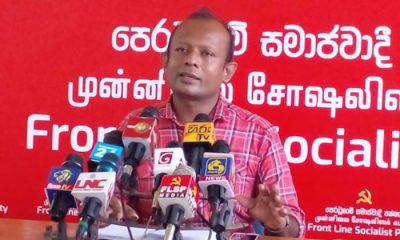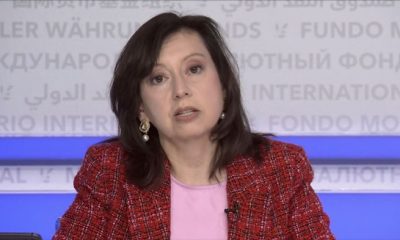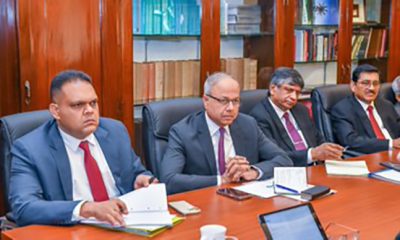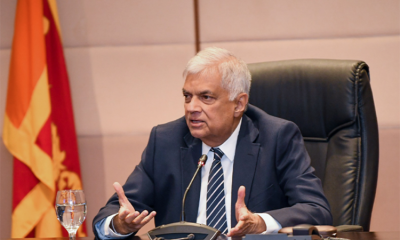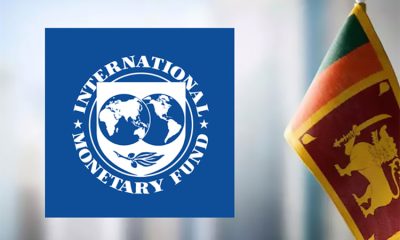News
Women’s rights groups reject current debt restructuring that places burden of repayment on working class
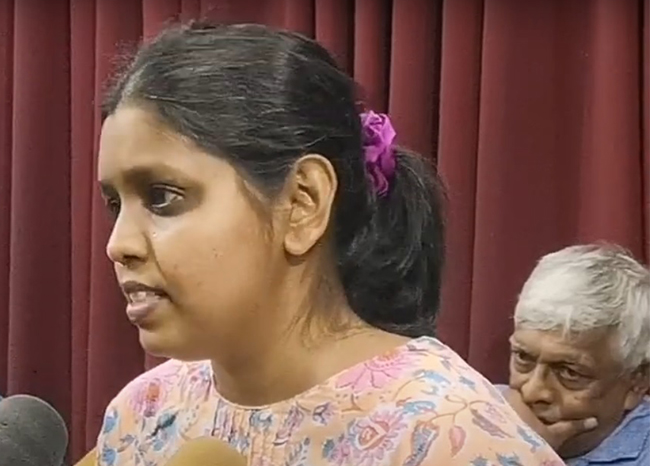
Women’s rights groups in Sri Lanka yesterday (11) rejected the current debt restructuring solutions that place the burden of repayment on Sri Lanka’s working classes, particularly its women.
Addressing a press conference, a number of women’s groups said they are demanding urgent and sustainable solutions to the ongoing debt crisis in Sri Lanka that respond to the actual lived experiences, struggles and needs of the people.
At the ‘National Convening on Debt and Women’s Human Rights’ held in Colombo on 9-10 August 2023, women’s rights groups from Sri Lanka and other Asian countries discussed the ways the ongoing crisis has impacted their lives and the inadequacy of government solutions to respond in meaningful ways. They also severely criticised the historical and current roles played by international financial institutions, mainly the World Bank and IMF, in imposing unjust austerity measures and their lack of accountability in worsening economic crises in the region.
Sri Lanka is currently going through a crippling economic crisis because of an unsustainable debt burden of 103.8 percent of GDP as of March 2023. This crisis hit households at a time when many had not yet recovered from the shocks of COVID-19. The government response of austerity measures to secure an International Monetary Fund bailout are being hurriedly rolled out, with no public consultation. This has included cuts in public spending, steep increases in utility tariffs, food and energy costs, indirect and regressive taxation, and limited cash handouts as social security.
This has particularly impacted low to middle income families, and labour laws that threaten to rollback gains in wage and job security, especially for women. Critically, the Government of Sri Lanka has decided to use the funds of the Employee Provident Fund to repay Sri Lanka’s debt – forcing Sri Lanka’s working class to bear the burden of repaying the wealthiest creditors – and has blocked resistance and legal challenges to the same.
“The social security funds of workers are being compromised to pay the debt for the richest income earners in the world. The government has decided to trade off the savings – for many of them this is the only savings – of some of the most hardworking people in Sri Lanka,” said lawyer and activist, Lakmali Hemachandra.
“There are severe violations going on with the domestic debt restructuring. The restructuring process is due to finish in September and by that time, workers will lose the security of their savings. We need the international community to hear and condemn the fact that creditors are being paid with workers’ savings and the Government and IMF is continuing to hold the position that there is people’s buy-in for this. There is no people’s buy-in, people just don’t have a way to communicate that,” Hemachandra said.
Juan Pablo Bohoslavsky, Former UN Independent Expert on Debt and Human Rights, said: “We also need to question why only domestic creditors have been asked by the government to make a sacrifice and accept, to some extent, a haircut in their credit. External debt holders should also be asked to make a similar contribution to bring sovereign debt to a sustainable level. According to international law, in the Sri Lankan context, prohibition of discrimination means inter-creditor equity in sovereign debt restructuring.”
The national convening was co-organised by the Law and Society Trust (LST), National Fisheries Solidarity Organisation (NAFSO), The Women and Media Collective (WMC), Colombo Urban Lab, The Asia Pacific Forum on Women, Law and Development (APWLD). Participants included representatives from groups of labour activists, trade unions, rural and urban women, academia, and civil society from Sri Lanka and Asia.
News
US sports envoys to Lanka to champion youth development

The U.S. Embassy in Colombo welcomed the U.S. Sports Envoys to Sri Lanka, former National Basketball Association (NBA) and Women’s National Basketball Association (WNBA) players Stephen Howard and Astou Ndiaye, from June 8 through 14.
The Public Diplomacy section of the U.S. Embassy said that it would launch a weeklong basketball program intended to harness the unifying power of sports, made possible through collaboration with Foundation of Goodness and IImpact Hoop Lab.
While in Sri Lanka, Howard and Ndiaye, both retired professional basketball players, will conduct a weeklong program, Hoops for Hope: Bridging Borders through Basketball. The Sports Envoys will lead basketball clinics and exhibition matches and engage in leadership sessions in Colombo and Southern Province for youth aged 14-18 from Northern, Uva, Eastern and Western Provinces, offering skills and leadership training both on and off the court. The U.S. Envoys will also share their expertise with the Sri Lanka Basketball Federation, national coaches, and players, furthering the development of basketball in the country. Beyond the clinics, they will collaborate with Sri Lankan schoolchildren to take part in a community service project in the Colombo area.
“We are so proud to welcome Stephen and Astou as our Sports Envoys to Sri Lanka, to build on the strong people-to-people connections between the United States and Sri Lanka,” said U.S. Ambassador Julie Chung. “The lessons that will be shared by our Sports Envoys – communication, teamwork, resilience, inclusion, and conflict resolution – are essential for leadership development, community building, equality, and peace. The U.S. Sports Envoy program is a testament to our belief that sports can be a powerful tool in promoting peace and unity.”
News
Rahuman questions sudden cancellation of leave of CEB employees

SJB Colombo District MP Mujibur Rahuman in parliament demanded to know from the government the reasons for CEB suspending the leave of all its employees until further notice from Thursday.
MP Rahuman said that the CEB has got an acting General Manager anew and the latter yesterday morning issued a circular suspending leave of all CEB employees with immediate effect until further notice.
“We demand that Minister Kanchana Wijesekera should explain this to the House. This circular was issued while this debate on the new Electricity Amendment Bill was pending. There are many who oppose this Bill. The Minister must tell parliament the reason for the urge to cancel the leave of CEB employees,” the MP said.However, Speaker Mahinda Yapa Abeywardena prevented Minister Wijesekera responding to the query and said that the matter raised by MP Rahuman was not relevant.
News
CIPM successfully concludes 8th Annual Symposium

The Chartered Institute of Personnel Management (CIPM) successfully concluded the 8th Annual CIPM Symposium, which took place on 31st May 2024. Themed “Nurturing the Human Element—Redefining HRM in a Rapidly Changing World,” the symposium underscored the pivotal role of human resource management (HRM) in today’s dynamic global landscape. Since its inception in 1959, CIPM has been dedicated to advancing the HR profession through education, professional development, and advocacy, solidifying its position as Sri Lanka’s leading professional body for HRM.
Ken Vijayakumar, the President of the CIPM, graced the occasion as the chief guest. The symposium commenced with the welcome address by the Chairperson, Prof. Arosha Adikaram, followed by the Web Launch of the Symposium Proceedings and Abstract Book by the CIPM President. The event featured distinguished addresses, including a speech by Chief Guest Ken Vijayakumar, President of CIPM, and an address by Guest of Honor Shakthi Ranatunga, Chief Operating Officer of MAS Holdings Pvt. Ltd., Sri Lanka.
The symposium also featured an inspiring keynote address by Prof. Mario Fernando, Professor of Management and Director of the Centre for Cross Cultural Management (CCCM) at the University of Wollongong, Australia.
Vote of Thanks of the inauguration session was delivered by Dr. Dillanjani Weeratunga, Symposium Co-chair.
The symposium served as a comprehensive platform for researchers to present their findings across a wide range of critical topics in HRM. These included Cultural Diversity and Inclusion, Talent Development and Retention, Ethical Leadership and Corporate Social Responsibility, Adapting to Technological Advancements, Mental Health and Well-being at Work, Global Workforce Challenges, Employee Empowerment, and Reskilling and Upskilling.
The plenary session was led by Prof. Wasantha Rajapakse. Certificates were awarded to the best paper presenters during the valedictory session, followed by a vote of thanks delivered by Kamani Perera, Manager of Research and Development.
The annual symposium of CIPM was a truly inclusive event, attracting a diverse audience that spanned undergraduates, graduates, working professionals, research scholars and lecturers. This widespread interest highlights the symposium’s significance in the field of HRM, offering a unique opportunity for everyone to network and learn from scholarly brains.The CIPM International Research Symposium was sponsored by Hambantota International Port, Sri Lanka Institute of Information Technology (SLIIT), E B Creasy & Co. PLC, and Print Xcel Company.


